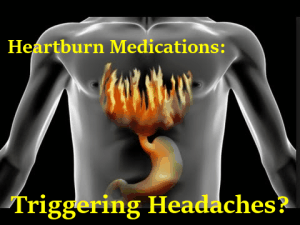Why Headache Patients Are Running from Esomeprazole (Nexium) and other “Heartburn” Drugs
Heartburn medications, such as esomeprazole (Nexium and other brand names), are so common, it’s not surprising that they get blamed for quite a number of symptoms. But some recent studies are making headache patients wonder – is the stomach cure making my head worse?
Esomeprazole belongs to a class of medications known as proton-pump inhibitors (PPIs). Other medications in this class include omeprazole (e.g. Prilosec, Losec), lansoprazole (e.g. Prevacid), and rabeprazole (e.g. AcipHex), among many others.
 Headache is actually a common, well-known side effect of PPIs. Other side effects include diarrhea, nausea, and abdominal pain.
Headache is actually a common, well-known side effect of PPIs. Other side effects include diarrhea, nausea, and abdominal pain.
If taken for more than three months, PPIs can also lead to low magnesium levels. Migraine sufferers in particular are familiar with the connection between magnesium and their condition. Low magnesium can also lead to general muscle stiffness.
In 2013, a study out of the USA showed that PPI use was related to B12 deficiency. B12 deficiency has been linked not only to cases of migraine, but also dementia. Interestingly, the risk of deficiency was especially high in young adults.
It seems that the PPIs interfere with the absorption of the vitamin.
Last month a study in Germany linked the use of PPIs with dementia yet again.
This does not mean that patients taking PPIs will automatically get dementia, or will automatically have B12 deficiency. And certainly there are people who benefit from at least short term use of PPIs.
However, the risks exist, especially for long term users. With concerns about risk of bone fractures, muscle stiffness, headache and dementia, it might be time to look into other options.
Writing about the recent studies, Dr. Alexander Mauskop of the New York Headache Clinic expressed concerns that tests for B12 levels are often not accurate, and that many doctors will be satisfied with lower vitamin D levels (also associated with dementia) than they should be.
Quitting PPIs
Getting off the PPI treadmill can be a challenge (talk to your doctor), but many patients have done it. The problem is that there can be rebound symptoms after a few days.
Dr. Mauskop’s recommendation – switch to a histamine-2 blocker (such as ranitidine or famotidine (Zantac and Pepcid) and an antacid such as Tums. Watch your diet, and after a few weeks you can stop taking the Zantac and rely only on atacids. Eventually you may be able to avoid the antacids as well.
Another suggestion is to start lowering your dosage of PPIs, for example going to one every day, to one every two days, and so on. Again, you can rely on antacids to get over the hump.
There are many other tips out there – probiotics, for one. Of course a healthy diet is key. But every patient is different.
Some resources that I have seen recommended include Dropping Acid: The Reflux Diet Cookbook & Cure, The Acid Reflux Escape Plan: Two Weeks to Heartburn Relief, Killing Me Softly From Inside: The Mysteries & Dangers Of Acid Reflux and The Acid-Alkaline Food Guide
Have you successfully quit PPIs? Tell us your story!
Other Sources and Resources:
- The Pill Book
- Proton Pump Inhibitor and Histamine 2 Receptor Antagonist Use and Vitamin B12 Deficiency
- Association of Proton Pump Inhibitors With Risk of Dementia
- Prilosec, Nexium and other heartburn drugs cause vitamin B12 deficiency.
- More on dangers of Prilosec and other PPIs
- Magnesium in man: implications for health and disease.
- Proton Pump Inhibitors May Increase Risk for Kidney Disease

5 September 2017 @ 10:51 am
Would give anything to get off script Nexium after 25 years. All other PPIs start migraines. Severe acid reflux and gastro Dr says stay on script to the tune of 900 dollars. Taking it as not much choice or pains like a heart attack. Tried all PPIs and migraine is triggered so feel i am trapped. Even give myself B12 shots as neuropothy set in due to lack of B12 so long. Ridiculous but great for drug companies